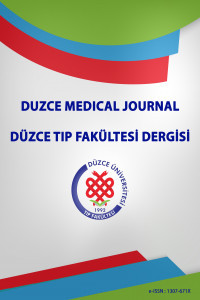Erkek İnfertilitesinin Cerrahi Dışı Tedavisi: Spesifik Olmayan Tedavi
Erkek infertilitesi, medikal tedavi, ampirik tedavi
Nonsurgical Treatment of Male Infertility: Non-Specific Therapy
Male infertility, medical treatment, empiric therapy,
___
- Irvine DS. Epidemiology and aetiology of male infertility. Hum Reprod. 1998;13(Suppl 1):33-44.
- Tournaye H, Krausz C, Oates RD. Novel concepts in the aetiology of male reproductive impairment. Lancet Diabetes Endocrinol. 2017;5(7):544-53.
- Rastrelli G, Lotti F, Reisman Y, Sforza A, Maggi M, Corona G. Metabolically healthy and unhealthy obesity in erectile dysfunction and male infertility. Expert Rev Endocrinol Metab. 2019;14(5):321-34.
- Håkonsen LB, Thulstrup AM, Aggerholm AS, Olsen J, Bonde JP, Andersen CY, et al. Does weight loss improve semen quality and reproductive hormones? Results from a cohort of severely obese men. Reprod Health. 2011;8:24.
- Lee Y, Dang JT, Switzer N, Yu J, Tian C, Birch DW, et al. Impact of bariatric surgery on male sex hormones and sperm quality: a systematic review and meta-analysis. Obes Surg. 2019;29(1):334-46.
- Ibañez-Perez J, Santos-Zorrozua B, Lopez-Lopez E, Matorras R, Garcia-Orad A. An update on the implication of physical activity on semen quality: a systematic review and meta-analysis. Arch Gynecol Obstet. 2019;299(4):901-21.
- Sharma R, Harlev A, Agarwal A, Esteves SC. Cigarette smoking and semen quality: a new meta-analysis examining the effect of the 2010 world health organization laboratory methods for the examination of human semen. Eur Urol. 2016;70(4):635-45.
- Ricci E, Al Beitawi S, Cipriani S, Candiani M, Chiaffarino F, Viganò P, et al. Semen quality and alcohol intake: a systematic review and meta-analysis. Reprod Biomed Online. 2017;34(1):38-47.
- Dabaja AA, Schlegel PN. Medical treatment of male infertility. Transl Androl Urol. 2014;3(1):9-16.
- Badenoch DF, Waxman J, Boorman L, Sidhu B, Moore HD, Holt WV, et al. Administration of a gonadotropin releasing hormone analogue in oligozoospermic infertile males. Acta Endocrinol (Copenh). 1988;117(2):265-7.
- Crottaz B, Senn A, Reymond MJ, Rey F, Germond M, Gomez F. Follicle-stimulating hormone bioactivity in idiopathic normogonadotropic oligoasthenozoospermia: double-blind trial with gonadotropin-releasing hormone. Fertil Steril. 1992;57(5):1034-43.
- Minhas S, Bettocchi C, Boeri L, Capogrosso P, Carvalho J, Cilesiz NC, et al. European association of urology guidelines on male sexual and reproductive health: 2021 update on male infertility. Eur Urol. 2021;80(5):603-20.
- Knuth UA, Honigl W, Bals-Pratsch M, Schleicher G, Nieschlag E. Treatment of severe oligospermia with human chorionic gonadotropin/human menopausal gonadotropin: a placebo-controlled, double blind trial. J Clin Endocrinol Metab. 1987;65(6):1081-7.
- Siddiq FM, Sigman M. A new look at the medical management of infertility. Urol Clin North Am. 2002;29(4):949-63.
- Matorras R, Pérez C, Corcóstegui B, Pijoan JI, Ramón O, Delgado P, et al. Treatment of the male with follicle-stimulating hormone in intrauterine insemination with husband's spermatozoa: a randomized study. Hum Reprod. 1997;12(1):24-8.
- Kumar R, Gautam G, Gupta NP. Drug therapy for idiopathic male infertility: rationale versus evidence. J Urol. 2006;176(4 Pt 1):1307-12.
- Attia AM, Abou-Setta AM, Al-Inany HG. Gonadotrophins for idiopathic male factor subfertility. Cochrane Database Syst Rev. 2013;8:CD005071.
- Jung JH, Seo JT. Empirical medical therapy in idiopathic male infertility: Promise or panacea? Clin Exp Reprod Med. 2014;41(3):108-14.
- Gordetsky J, van Wijngaarden E, O'Brien J. Redefining abnormal follicle-stimulating hormone in the male infertility population. BJU Int. 2012;110(4):568-72.
- Clark RV, Sherins RJ. Treatment of men with idiopathic oligozoospermic infertility using the aromatase inhibitor, testolactone. Results of a double-blinded, randomized, placebo-controlled trial with crossover. J Androl. 1989;10(3):240-7.
- Saylam B, Efesoy O, Cayan S. The effect of aromatase inhibitor letrozole on body mass index, serum hormones, and sperm parameters in infertile men. Fertil Steril. 2011;95(2):809-11.
- Raman JD, Schlegel PN. Aromatase inhibitors for male infertility. J Urol. 2002;167(2 Pt 1):624-9.
- Del Giudice F, Busetto GM, De Berardinis E, Sperduti I, Ferro M, Maggi M, et al. A systematic review and meta-analysis of clinical trials implementing aromatase inhibitors to treat male infertility. Asian J Androl. 2020;22(4):360-7.
- Cannarella R, Condorelli RA, Mongioi LM, Barbagallo F, Calogero AE, La Vignera S. Effects of the selective estrogen receptor modulators for the treatment of male infertility: a systematic review and meta-analysis. Expert Opin Pharmacother. 2019;20(12):1517-25.
- World Health Organization. A double-blind trial of clomiphene citrate for the treatment of idiopathic male infertility. Int J Androl. 1992;15(4):299-307.
- Cocuzza M, Agarwal A. Nonsurgical treatment of male infertility: specific and empiric therapy. Biologics. 2007;1(3):259-69.
- Kamischke A, Nieschlag E. Analysis of medical treatment of male infertility. Hum Reprod. 1999;14(Suppl 1):1-23.
- Chua ME, Escusa KG, Luna S, Tapia LC, Dofitas B, Morales M. Revisiting oestrogen antagonists (clomiphene or tamoxifen) as medical empiric therapy for idiopathic male infertility: a meta-analysis. Andrology. 2013;1(5):749-57.
- Ross C, Morriss A, Khairy M, Khalaf Y, Braude P, Coomarasamy A, et al. A systematic review of the effect of oral antioxidants on male infertility. Reprod Biomed Online. 2010;20(6):711-23.
- Steiner AZ, Hansen KR, Barnhart KT, Cedars MI, Legro RS, Diamond MP, et al. The effect of antioxidants on male factor infertility: the Males, Antioxidants, and Infertility (MOXI) randomized clinical trial. Fertil Steril. 2020;113(3):552-60.e3.
- Smits RM, Mackenzie-Proctor R, Yazdani A, Stankiewicz MT, Jordan V, Showell MG. Antioxidants for male subfertility. Cochrane Database Syst Rev. 2019;3(3):CD007411.
- Yayın Aralığı: Yılda 3 Sayı
- Başlangıç: 1999
- Yayıncı: Düzce Üniversitesi Tıp Fakültesi
Erkek İnfertilitesinin Cerrahi Tedavisi
Kadın İnfertilitesinde AMH’nin Değerlendirilmesi ve Yorumlanması
Berna DİLBAZ, Şule ATALAY MERT
Azospermisi olan İnfertil Erkeğe Yaklaşım
Yardımcı Üreme Teknolojisi için Cerrahi Sperm Elde Etme Teknikleri
Mehmet Vehbi KAYRA, Tahsin TURUNÇ
Erkek İnfertilitesinin Cerrahi Dışı Tedavisi: Spesifik Olmayan Tedavi
Kadın İnfertilitesinin Genetik Nedenlerine Güncel Yaklaşım ve Genetik Danışmanlık
Nıgar SHIRINOVA, Fatma Zehra YALÇIN, Sevcan TUĞ BOZDOĞAN
Erkek İnfertilitesinin Değerlendirilmesi
Muhammed Arif İBİŞ, Önder YAMAN
Erkek İnfertilitesinin Genetik Nedenlerine Güncel Yaklaşım ve Genetik Danışmanlık
Muhammed Burak BEREKETOĞLU, Rashad ABDULLAYEV, Sevcan TUĞ BOZDOĞAN
Kadın İnfertilitesinin Değerlendirilmesi ve Yorumlanması
Serdar ÖZER, Alev ÖZER, Hakan KIRAN
